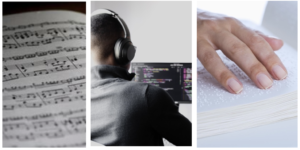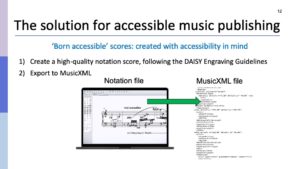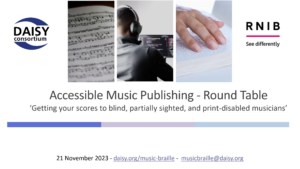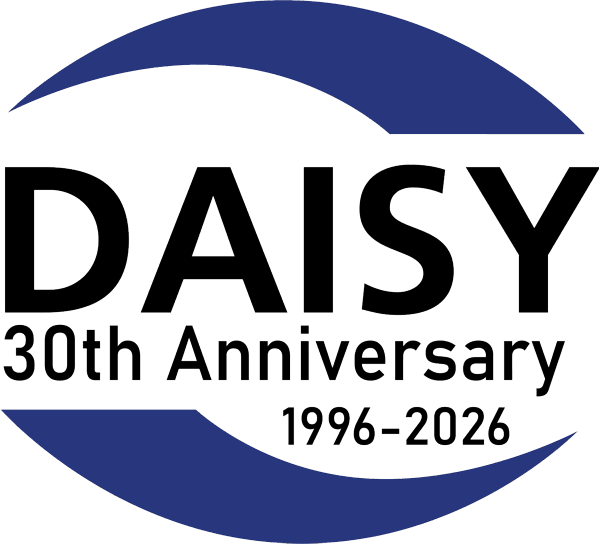Accessible Music Publishing

- This page is for: music publishers, engravers, composers and anyone creating music scores using music notation software.
- This is a collaborative initiative between the DAISY Consortium and the Royal National Institute of Blind People (RNIB).
Introduction
Making your scores available in MusicXML format is a powerful way to support musicians with print disabilities, enabling them to access, interpret, and perform your work using assistive technologies such as braille, Modified Stave Notation, and screen readers.
This not only broadens your audience but also aligns your work with accessibility and inclusivity standards, showcasing your commitment to equity in the arts.
MusicXML safeguards your scores by ensuring they remain adaptable to evolving technologies, while still allowing you full control over distribution to musicians with print disabilities.
The best part? The process is straightforward. Tools like MuseScore and Sibelius let you create high-quality scores following the DAISY Engraving Guidelines, and exporting them as MusicXML is quick and easy. This ensures that musicians with print disabilities can access your music in the format that works best for them.
Join us today – by taking this step, you help to foster a more inclusive music community and ensure your compositions can inspire and be performed by all musicians.
Why do blind musicians need accessible scores?
"For years, I’ve had to rely on others to transcribe my music into Braille, and if it could even be done, I’d often be waiting months before I could hold the score in my hands. It felt like I was always a step behind, waiting for what others had access to straight away. But now, with a quality MusicXML file, I can use my specialist software to read the music in braille straight away - no delays, no waiting. This is the first time I feel truly independent and able to keep up with my sighted peers in real-time." JRWant to see how it works?
Watch video demonstrations of:
- a blind user creating a score in a notation software (MuseScore) with assistive technology
- a blind user converting their notation file from MusicXML into music braille using a specialist converter tool (SMB)

Presentation for publishers
“MusicXML: the key to accessible music publishing”
PDF slides and transcript from a presentation to the ICCARE Partition and digital music conference, Versailles Baroque Music Center, 18.02.2025.
Why are publishers working with us on accessible music publishing?
Taylor & Francis: “because of the importance of making music content fully accessible to ensure everyone, regardless of ability, can engage with and benefit from it.”
Schott Music: “to make significant steps toward creating lasting, industry-wide change for those who require alternative print formats.”
ChoirCommunity: “We have been able to make a number of our arrangements available to visually impaired singers and choir leaders this year already.”
ABRSM: “to make this dream a reality that is both customer-focussed and sustainable.”
Hal Leonard: “to establish a more universally accessible printed music format from the outset.”
Guidance for music engraving / music setting

We have developed good practice guidelines for engravers/setters (using music notation software MuseScore, Sibelius and Finale). These have been trialled with engraving services and publishers and greatly improve the accessibility of the digital score content they create at source. This enables more effective conversion into accessible formats including music braille and Modified Stave Notation.
Read the latest DAISY Engraving Guidelines on a separate page.
Accessible Music Publishing Action Group (AMPAG)
At the ‘Accessible Music Publishing Round Table’ (21.11.2023) we agreed to form a ‘Publishing Action Group’ on accessible music (scores for musicians with print disabilities).
AMPAG is an expanding group of engaged music publishers, engraving services, and producers of accessible format materials working together to establish how to incorporate the creation of ‘born-accessible’ MusicXML files into their workflow and distribution processes.
| Participating publishers and engraving services | Participating producers of accessible format materials |
|
|
Themes covered at AMPAG meetings
- Accessible score production processes: Establishing and trialling processes to ensure that music scores – both new and existing – are accessible, well-formatted, and compliant with accessibility standards during commissioning (‘born accessible’), and during remediation of back-list publications. Exploring the production and use of accessible music textbooks.
- Policy and services: Developing, aligning with, and learning from industry-wide accessibility policies and practices for the creation and distribution of accessible scores to persons with print disabilities.
- Awareness raising and collaboration: Promoting the need for accessible music publishing within the music publishing sector, and fostering inter-disciplinary collaboration between publishers, transcribers of accessible format materials, standards bodies and end users with print disabilities.
- Tools and technologies: Leveraging innovations to improve accessible music production, distribution, and conversion into accessible formats.
- Guidance for customers: Developing clear and practical information for customers receiving MusicXML files from publishers on how to use these files with screen-access technology, and for conversion into accessible formats.
Join us
If you or your organization would like to take an active part in this collaborative action group, please drop us a line at: MusicPublishing@daisy.org
Round Table on Accessible Music Publishing 21.11.2023
 The international DAISY Consortium and the Royal National Institute of Blind People (RNIB) invited music publishers, composers, and music-setters/engravers to take part in an online Round Table on Accessible Music Publishing. The event explored various sector requirements, through presentations and discussions between: mainstream music publishers (including exam boards), braille and other accessible format producers, blind, partially sighted, and print-disabled musicians, music setters/engravers, music notation software producers.
The international DAISY Consortium and the Royal National Institute of Blind People (RNIB) invited music publishers, composers, and music-setters/engravers to take part in an online Round Table on Accessible Music Publishing. The event explored various sector requirements, through presentations and discussions between: mainstream music publishers (including exam boards), braille and other accessible format producers, blind, partially sighted, and print-disabled musicians, music setters/engravers, music notation software producers.
We discussed steps that the global sector can take to ensure equitable access to published scores, in response to legislation and to take advantage of technological advances, with the aim of establishing a sector Working Group and trialling some solutions.
Materials available from the Round Table
Notes (for download):
- Agenda and speakers with video timestamps, main links and Q&A topics
- Presenters, links, and attendees
- Invitation
Presentations (videos open in new window on YouTube):
- Full video recording of the Round Table (3 hours)
- Video: James Yanchak, Taylor & Francis (3 mins)
- Video: John Rutter CBE, Composer (45 secs)
- Video: Roxanna Panufnik, Composer (35 secs)
- Video: Derek Benton, MuseScore Engraver (6 mins)
- Accessibility in Sibelius – PowerPoint presentation from Sam Butler, Avid Audio
The Marrakesh Treaty and accessible format production
The WIPO-administered Marrakesh Treaty makes the production and international transfer of specially-adapted books (for people with blindness, visual impairments or other print disabilities) easier. It does this by establishing a set of limitations and exceptions to traditional copyright law. The Marrakesh Treaty was adopted on June 27, 2013, and entered into force on September 30, 2016.
Read WIPO’s overview of the Marrakesh Treaty, and find out more about WIPO, Authorized Entities, and the ABC Global Book Consortium.
Stay involved
Join our mailing list to stay connected and join working groups related to accessible music publishing, by emailing us at: MusicPublishing@daisy.org
